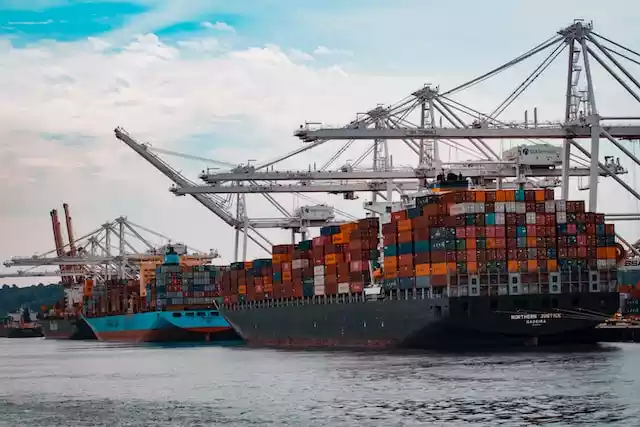The Importance of Import and Export to a Country
The importance of import and export to a country cannot be underestimated. International trade serves as a vital catalyst for economic growth, job creation, and cultural exchange.

In this article, we will look into the various dimensions of import and export, shedding light on their profound significance for a country’s prosperity.
So, let’s get down on a journey through the world of international trade and explore why it holds such immense importance for a country.
Table of Contents
What is Import and Export?
Before we dive into the importance of import and export, let’s first clarify what these terms mean.
Import refers to the act of bringing goods and services into a country from foreign sources, while export refers to the sale and shipment of domestically produced goods to other countries.
Essentially, import is the process of acquiring products from overseas, and export is the process of selling products to foreign markets.
The Economic Significance of Import and Export
- Boosting Economic Growth: Import and export activities contribute significantly to a country’s economic growth.
By engaging in international trade, nations can access a wider range of goods and services, enhancing consumer choices and stimulating competition within domestic markets.
This, in turn, encourages innovation, drives productivity, and fuels economic expansion. - Job Creation: The import and export industry is a major source of employment opportunities. When a country engages in trade, it opens avenues for businesses to expand, leading to increased job creation.
From manufacturing and logistics to sales and marketing, a multitude of roles emerge to support the import and export processes, fostering economic prosperity and reducing unemployment rates. - Foreign Direct Investment (FDI): A thriving import and export sector attracts foreign direct investment. When countries actively participate in global trade, they become attractive destinations for international businesses seeking new markets.
Foreign companies may choose to establish subsidiaries or invest in local businesses, bringing in capital, technology, and expertise.
This infusion of foreign investment strengthens the domestic economy and drives further growth. - Enhancing Productivity: Engaging in import and export activities encourages specialization and economies of scale. Countries can focus on producing goods and services in which they have a comparative advantage, leading to increased efficiency and productivity.
For instance, a country abundant in natural resources may export raw materials, while another nation with advanced manufacturing capabilities may import these resources to produce finished goods.
This division of labor allows each country to maximize its potential and achieve higher productivity levels. - Diversifying Revenue Streams: Relying solely on domestic consumption can be risky for a country’s economy. By engaging in import and export, nations can diversify their revenue streams.
If the domestic market experiences a downturn, businesses can turn to international markets for sales and revenue generation.
This diversification helps reduce economic vulnerability and ensures a more stable and resilient economy.
The Social and Cultural Significance of Import and Export
- Cultural Exchange: Import and export facilitate cultural exchange between nations. Through trade, countries not only exchange goods but also share ideas, knowledge, and values.
Imported goods expose domestic populations to new cultures, traditions, and perspectives, enriching their understanding of the world.
Similarly, exported goods carry a country’s identity and heritage to foreign lands, fostering cultural appreciation and understanding. - Improving Living Standards: Import and export play a vital role in improving living standards. By importing goods and services, countries can access a wider variety of products, including those that may not be locally available or are cost-prohibitive to produce domestically.
This allows consumers to enjoy a higher quality of life with access to diverse and affordable options.
In addition, the revenue generated through exports can be reinvested in social welfare programs, infrastructure development, and public services, further enhancing living standards. - Technology Transfer: International trade facilitates the transfer of technology and knowledge across borders. When countries engage in import and export, they have the opportunity to acquire advanced technologies and production methods from more developed nations.
This technology transfer enables domestic industries to upgrade their capabilities, enhance efficiency, and foster innovation.
As a result, countries can achieve technological advancements and accelerate their economic development. - Peaceful Relations: Import and export can contribute to fostering peaceful relations between nations. Through trade, countries establish economic interdependence, realizing that cooperation and mutual benefits outweigh conflicts.
Trade partnerships build trust and encourage diplomatic dialogue, creating a foundation for peaceful interactions.
By engaging in import and export, countries become interconnected in a web of economic relationships, strengthening international ties and promoting global stability. - Humanitarian Aid and Disaster Relief: Import and export are important during times of crises, such as natural disasters or humanitarian emergencies.
Countries can import essential supplies, including food, medicine, and relief materials, to support affected regions.
Conversely, countries with surplus resources can export aid to nations in need. The import and export industry, with its logistical capabilities and global networks, plays a vital role in ensuring the timely delivery of aid and relief efforts.
Wrap Up
Import and export are integral elements of a country’s economic, social, and cultural fabric. The importance of engaging in international trade cannot be overstated, as it drives economic growth, job creation, technological advancements, and cultural exchange.
By embracing import and export activities, countries can unlock new opportunities, diversify their revenue streams, and foster peaceful relations with other nations. In an interconnected world, the significance of import and export to a country’s prosperity is undeniable.
FAQs about the Importance of Import and Export to a Country
- Why is import and export important for economic growth? Import and export contribute to economic growth by expanding market opportunities, promoting competition, and driving innovation. Through international trade, countries can access a wider range of goods and services, fostering productivity and creating employment opportunities.
- What are the benefits of engaging in import and export activities? Engaging in import and export activities brings several benefits, including job creation, diversification of revenue streams, access to new markets, technological advancements, and cultural exchange. It also strengthens the domestic economy and enhances living standards.
- How does import and export contribute to international relations? Import and export contribute to fostering peaceful relations between nations. By engaging in trade, countries establish economic interdependence and develop mutual interests, which can lead to diplomatic dialogues, collaborations, and peaceful interactions.
- What role does import and export play in disaster relief efforts? Import and export play an important role in disaster relief efforts by enabling the timely importation of essential supplies to affected regions. Countries can import food, medicine, and relief materials, while those with surplus resources can export aid to support nations in need.
- Can a country solely rely on domestic consumption without engaging in import and export? While a country can rely on domestic consumption to some extent, solely depending on the domestic market can be risky. Engaging in import and export activities allows countries to diversify their revenue streams, reduce economic vulnerability, and ensure a more stable and resilient economy.
- How does import and export contribute to cultural exchange? Import and export facilitate cultural exchange by enabling the exchange of goods, ideas, knowledge, and values between countries. Imported goods expose domestic populations to different cultures, traditions, and perspectives, while exported goods carry a country’s identity and heritage to foreign lands.





